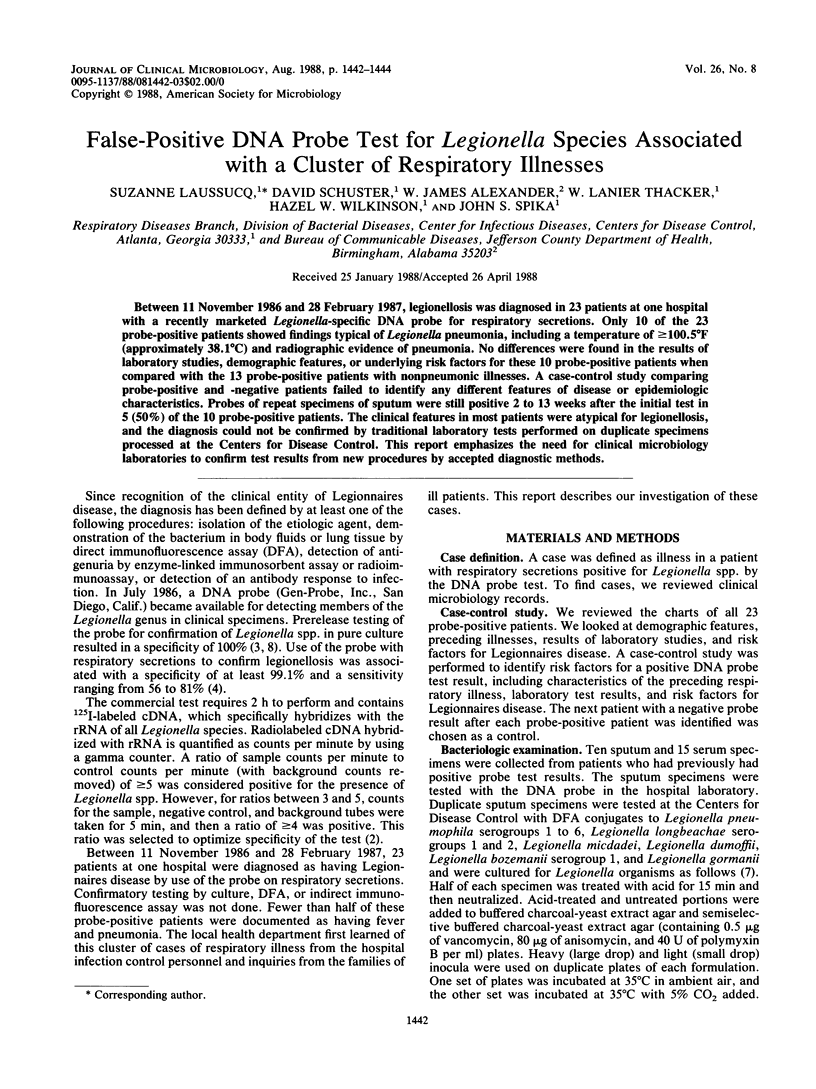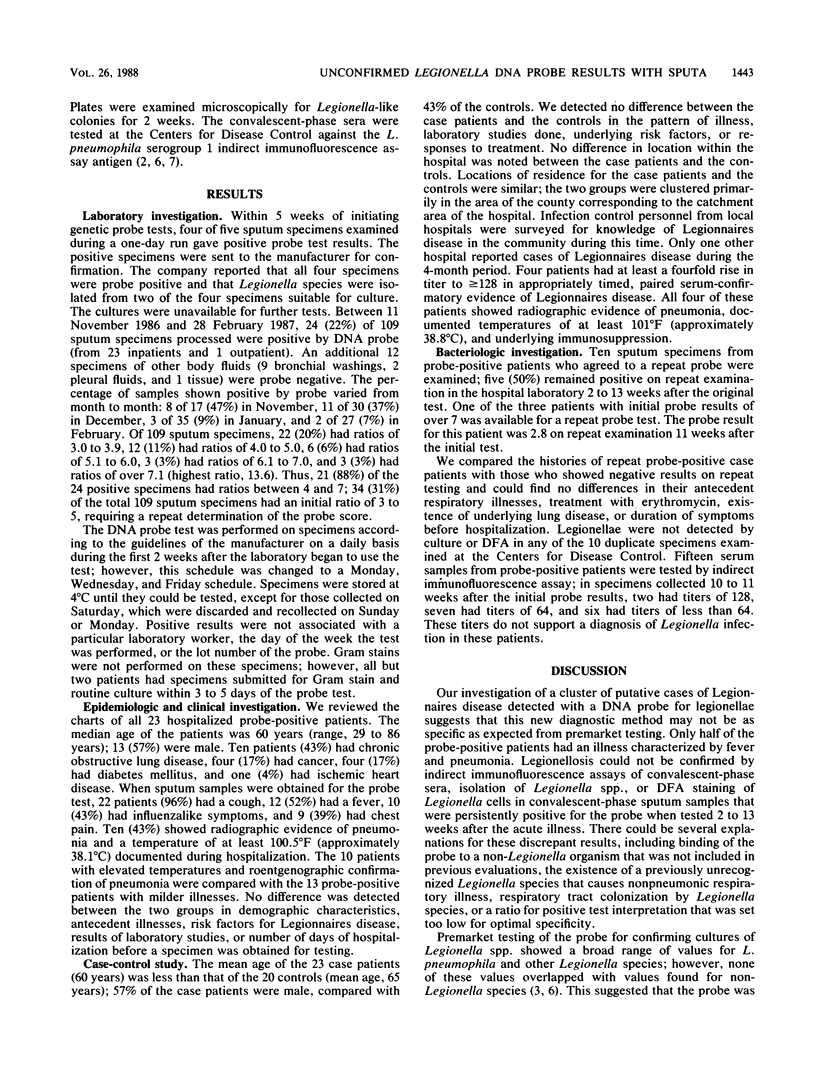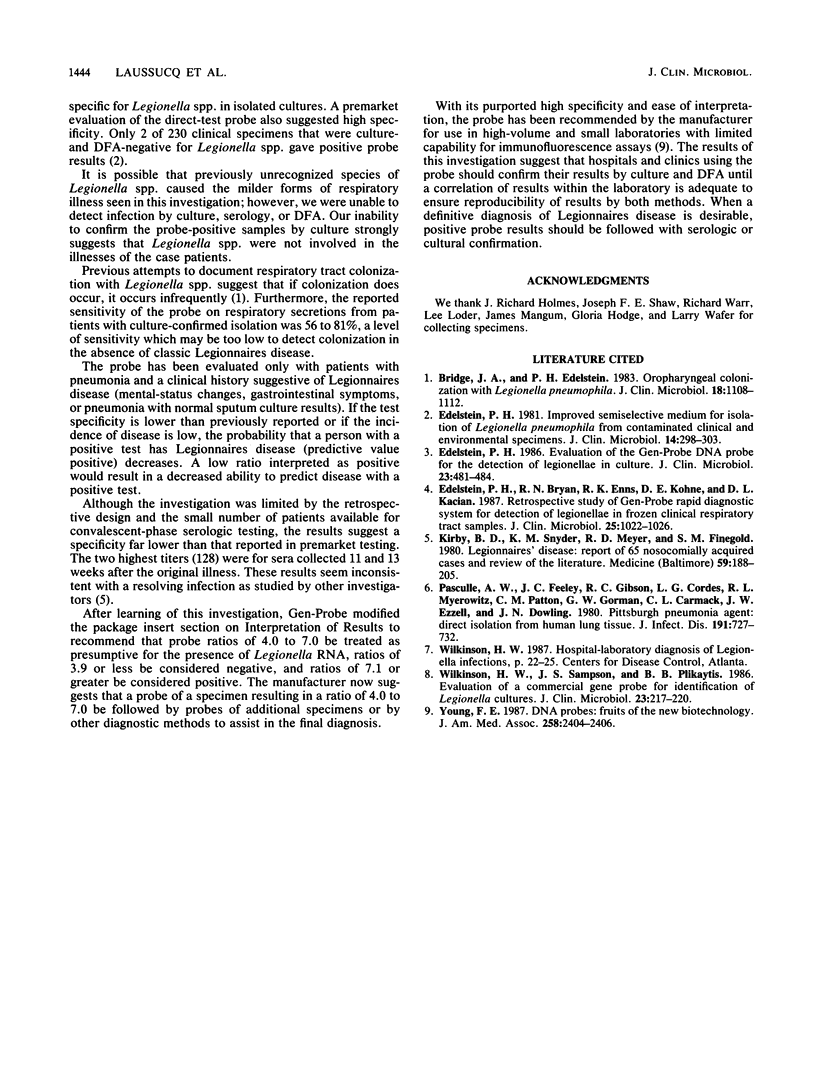Abstract
Between 11 November 1986 and 28 February 1987, legionellosis was diagnosed in 23 patients at one hospital with a recently marketed Legionella-specific DNA probe for respiratory secretions. Only 10 of the 23 probe-positive patients showed findings typical of Legionella pneumonia, including a temperature of greater than or equal to 100.5 degrees F (approximately 38.1 degrees C) and radiographic evidence of pneumonia. No differences were found in the results of laboratory studies, demographic features, or underlying risk factors for these 10 probe-positive patients when compared with the 13 probe-positive patients with nonpneumonic illnesses. A case-control study comparing probe-positive and -negative patients failed to identify any different features of disease or epidemiologic characteristics. Probes of repeat specimens of sputum were still positive 2 to 13 weeks after the initial test in 5 (50%) of the 10 probe-positive patients. The clinical features in most patients were atypical for legionellosis, and the diagnosis could not be confirmed by traditional laboratory tests performed on duplicate specimens processed at the Centers for Disease Control. This report emphasizes the need for clinical microbiology laboratories to confirm test results from new procedures by accepted diagnostic methods.
Full text
PDF


Selected References
These references are in PubMed. This may not be the complete list of references from this article.
- Bridge J. A., Edelstein P. H. Oropharyngeal colonization with Legionella pneumophila. J Clin Microbiol. 1983 Nov;18(5):1108–1112. doi: 10.1128/jcm.18.5.1108-1112.1983. [DOI] [PMC free article] [PubMed] [Google Scholar]
- Edelstein P. H., Bryan R. N., Enns R. K., Kohne D. E., Kacian D. L. Retrospective study of Gen-Probe rapid diagnostic system for detection of legionellae in frozen clinical respiratory tract samples. J Clin Microbiol. 1987 Jun;25(6):1022–1026. doi: 10.1128/jcm.25.6.1022-1026.1987. [DOI] [PMC free article] [PubMed] [Google Scholar]
- Edelstein P. H. Evaluation of the Gen-Probe DNA probe for the detection of legionellae in culture. J Clin Microbiol. 1986 Mar;23(3):481–484. doi: 10.1128/jcm.23.3.481-484.1986. [DOI] [PMC free article] [PubMed] [Google Scholar]
- Edelstein P. H. Improved semiselective medium for isolation of Legionella pneumophila from contaminated clinical and environmental specimens. J Clin Microbiol. 1981 Sep;14(3):298–303. doi: 10.1128/jcm.14.3.298-303.1981. [DOI] [PMC free article] [PubMed] [Google Scholar]
- Kirby B. D., Snyder K. M., Meyer R. D., Finegold S. M. Legionnaires' disease: report of sixty-five nosocomially acquired cases of review of the literature. Medicine (Baltimore) 1980 May;59(3):188–205. [PubMed] [Google Scholar]
- Pasculle A. W., Feeley J. C., Gibson R. J., Cordes L. G., Myerowitz R. L., Patton C. M., Gorman G. W., Carmack C. L., Ezzell J. W., Dowling J. N. Pittsburgh pneumonia agent: direct isolation from human lung tissue. J Infect Dis. 1980 Jun;141(6):727–732. doi: 10.1093/infdis/141.6.727. [DOI] [PubMed] [Google Scholar]
- Wilkinson H. W., Sampson J. S., Plikaytis B. B. Evaluation of a commercial gene probe for identification of Legionella cultures. J Clin Microbiol. 1986 Feb;23(2):217–220. doi: 10.1128/jcm.23.2.217-220.1986. [DOI] [PMC free article] [PubMed] [Google Scholar]
- Young F. E. DNA probes. Fruits of the new biotechnology. JAMA. 1987 Nov 6;258(17):2404–2406. doi: 10.1001/jama.258.17.2404. [DOI] [PubMed] [Google Scholar]


